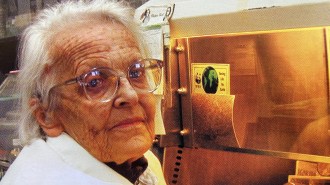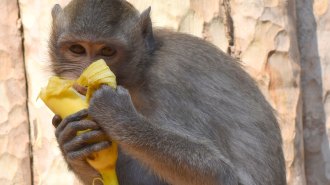Uncategorized
-

-

-
 Health & Medicine
Health & MedicineBy taking on poliovirus, Marguerite Vogt transformed the study of all viruses
She pioneered the field of molecular virology with her meticulous lab work and “green thumb” for tissue culture.
-
 Paleontology
PaleontologyFossil tracks may reveal an ancient elephant nursery
Fossilized footprints at a site in Spain include those of an extinct elephant’s newborns, suggesting the animals may have used the area as a nursery.
By Sid Perkins -
 Archaeology
ArchaeologyStone Age people used bone scrapers to make leather and pelts
African cave finds include remains of skinned creatures and hide scrapers made from animal ribs.
By Bruce Bower -
 Animals
AnimalsSome birds learn to recognize calls while still in their eggs
For over a decade, behavioral ecologist Diane Colombelli-Négrel and colleagues have been studying how birds perceive sounds before hatching.
-
 Climate
ClimateAustralian fires in 2019–2020 had even more global reach than previously thought
Recent devastating wildfires in Australia added vast amounts of carbon dioxide to the air and triggered blooms of marine algae in the Southern Ocean.
-
 Humans
HumansFossils and ancient DNA paint a vibrant picture of human origins
Paleoanthropologists have sketched a rough timeline of how human evolution played out, centering the early action in Africa.
By Erin Wayman -
 Agriculture
AgriculturePotty-trained cattle could help reduce pollution
About a dozen calves have been trained to pee in a stall. Toilet training cows on a large scale could cut down on pollution, researchers say.
-
 Animals
AnimalsMary Roach’s new book ‘Fuzz’ explores the ‘criminal’ lives of animals
In “Fuzz: When Nature Breaks the Law,” author Mary Roach profiles mugging monkeys, thieving bears and other animal outlaws.
-
 Earth
EarthHow AI can help forecast how much Arctic sea ice will shrink
Trained on sea ice observations and climate simulations, IceNet is 95 percent accurate in forecasting sea ice extent two months in advance.
-
 Astronomy
AstronomyA supernova’s delayed reappearance could pin down how fast the universe expands
“SN Requiem” should reappear in the 2030s and help determine the universe’s expansion rate.
By Ken Croswell